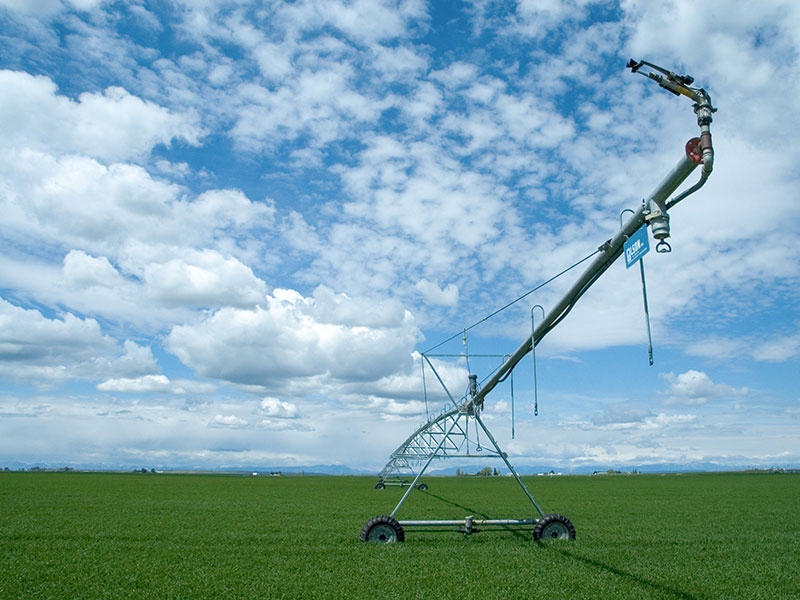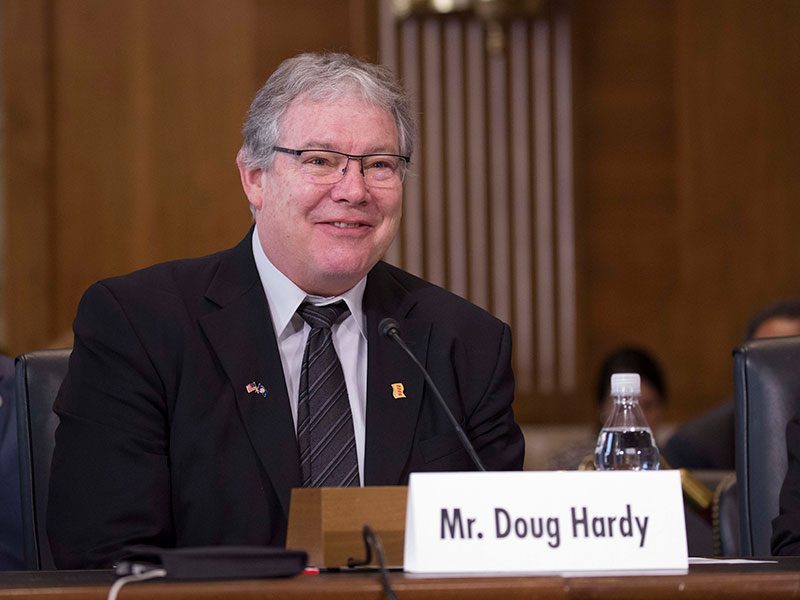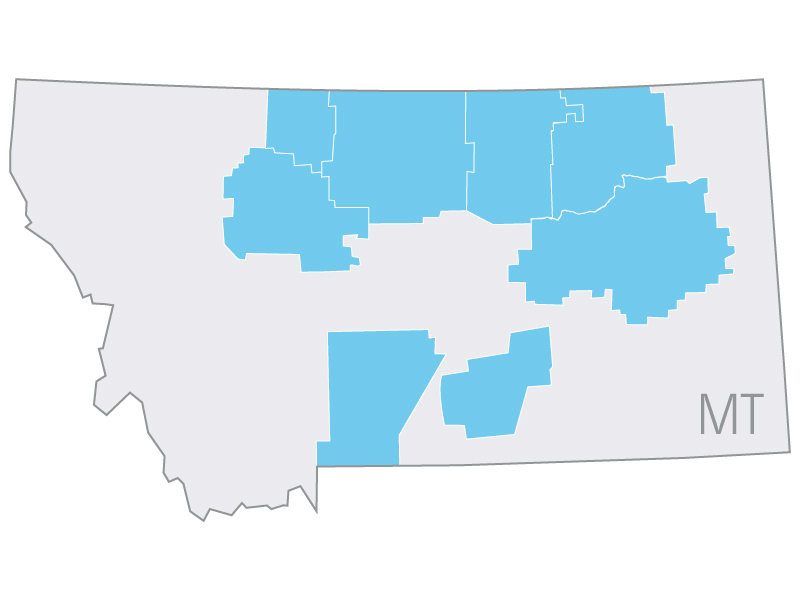Dakota Gasification Company
Headquarters:
1717 East Interstate Avenue | Bismarck, ND 58503-0564 USA
701.223.0441 | 1.800.242.2372
Great Plains Synfuels Plant
420 County Road 26
Beulah, ND 58523-9400 USA
701-873-2100
A subsidiary of:

Take Massachusetts, Rhode Island, Connecticut, Delaware, and New Jersey, add a little more space and you’ll end up with the area served by four of the eight members belonging to Basin Electric Class A member Central Montana Electric Power Cooperative. If you wanted to get to all of Central Montana Electric’s members you’d have to drive a 1,000-mile loop from its headquarters in Great Falls, Montana.
Central Montana Electric’s distribution cooperatives serve some of the most rural areas in Montana. The co-op’s CEO Doug Hardy says these areas are “far past the federal definition of rural – they’re frontier.”
Hardy says four of its member cooperatives have, on average, just under three-quarters of one member per mile of line. “When we say we’re here to serve rural America, this is exactly the place we’re talking about,” he says.
But not all of the co-op’s service area is rural. It also serves more urban areas such as the Billings, Montana, area, which is growing significantly as the city is expanding. Hardy says the members at the end of the electrical lines are “wonderful, salt of the earth Montanans.”

The co-op’s service area is as diverse as the state of Montana itself. Just as the state consists of plains and snow-capped mountains, Central Montana Electric serves members at elevations as low as 2,000 and as high as 9,000 feet above sea level.
“We serve areas in mountains with beautiful seasonal homes and areas that are very flat,” Hardy says. “As you can imagine we’re seeing significant growth in the areas that have mountains and water.”
While the density of Central Montana Electric’s system is very low, its load is highly residential, which is a benefit because it means stability. “Financial institutions look for residential load when lending money, and we definitely bring that to Basin Electric’s table,” Hardy says. “We generally have a low load factor because we don’t serve business and industry as much as other systems, but it’s good, consistent load for us.”
In addition to homes and farms, the co-op provides electricity for irrigation; a couple members serve old oil wells that run when oil prices are high; a member that serves a pipeline’s pumps; another serves a mine; and several serve some smaller businesses. Hardy says one of its member systems, Yellowstone Valley Electric, a Basin Electric Class C member, serves more suburban loads including schools and businesses as the city grew out into its service area, but it continues to have its rural loads.
Unlike many other rural electric cooperatives, Central Montana Electric does not own its transmission resources. Hardy says that much of its power is delivered over transmission owned by NorthWestern Energy, a company that provides generation and transmission services to Montana and South Dakota. “NorthWestern’s system was built before the co-ops even existed,” Hardy says. “Owning our own transmission isn’t practical due to our geography, density, and location, so it is far more cost effective to wheel over existing transmission and for our members to own their transmission.”

Hardy is the sole office employee at Central Montana Electric. He does everything from answering the phones to testifying before Congress in Washington, D.C. on behalf of his and other rural electric cooperatives. He is currently starting his 48th year in the rural electric industry, beginning his career with Central Montana Electric member and Basin Electric Class C member Park Electric then moving to his current co-op in 2008.
Some of the lessons he’s learned over the past nearly five decades have served both him and the cooperatives he’s worked for very well. Lessons like assessing the short- and long-term impacts decisions have on members.
“I’ve learned that I don’t get to spend a single penny that hasn’t come from one of our members’ pockets,”
Hardy says. “I’ve learned to volunteer to do things nobody else wants to do because some of those things have applications you would never have anticipated. I’ve learned that good luck follows hard work. And I’ve learned that knowing what you don’t know is just as, or more important than what you do know.”
Hardy says he continues to work because he appreciates the opportunity to make a difference, the perfect job for someone who has devoted his life to the cooperative business model.

Like Central Montana Electric, Basin Electric’s service area is diverse, generating power from several sources and serving various types of loads, terrains, climates, rural areas, and larger cities from the northern part of the nation to as far south as New Mexico. Hardy says the diversity of Basin Electric’s footprint creates a huge amount of risk management for a co-op like Central Montana Electric, helping keep electricity reliable and rates affordable.
“There is a commonality between Central (Montana Electric) and Basin,” Hardy says. “We’re both cooperatives that look out for the members at the end of our lines. However different the loads and members are, that commonality is crucial. Providing affordable power on a consistent and long-term basis is absolutely critical.”
Hardy says in the late 1990s there was a push by a large investor-owned utility in Montana to allow customers to choose who their energy provider would be. “We knew that was not in our members’ best interests. We knew Basin has firm sources of supply that are not volatile like the market, which went through the roof pricewise as Enron fell a few short years after the investor-owned provided choice,” he says. “It’s important to appreciate how cyclical things can be. Consider the long-term impacts of your decisions – don’t be attracted to a low price with the misassumption that it will always stay low – that is the danger of relying solely on the market.”
Hardy stresses the importance of cooperative governance, saying, “If you don’t have governance, you can be in trouble,” he says. “And if that governance is not going in the direction of the grassroots, you’re likely going in the wrong direction. Our members are who we exist for.”
Central Montana Electric Power Cooperative is a wholesale energy provider that delivers electricity to its eight members who then distribute it to homes, farms, and businesses across rural Montana. These distribution cooperatives, all Basin Electric Class C members, make up Central Montana Electric.
Big Flat Electric Cooperative – Malta
Hill County Electric Cooperative – Havre
Marias River Electric Cooperative– Shelby
McCone Electric Cooperative– Circle
NorVal Electric Cooperative – Opheim
Park Electric Cooperative – Livingston
Sun River Electric Cooperative – Fairfield
Yellowstone Valley Electric Cooperative – Huntley
*Glacier Electric Cooperative – Cut Bank
*Vigilante Electric Cooperative – Dillon
*Non-purchasing member that receives power from the Bonneville Power Administration
Dakota Gasification Company
Headquarters:
1717 East Interstate Avenue | Bismarck, ND 58503-0564 USA
701.223.0441 | 1.800.242.2372
Great Plains Synfuels Plant
420 County Road 26
Beulah, ND 58523-9400 USA
701-873-2100
A subsidiary of:
Basin Electric wants all interested and qualified candidates to apply for employment opportunities. If you are an applicant with a disability who is unable to use our online tools to search and apply for jobs, or who needs other assistance or accommodations, please contact us at 701-223-0441. Please indicate the specifics of the assistance needed or provide your contact information, and a Basin Electric Human Resources representative will contact you. Basin Electric is an Equal Employment Opportunity Employer regarding race, color, religion, sex, sexual orientation, gender identity, national origin, disability, and veterans status.